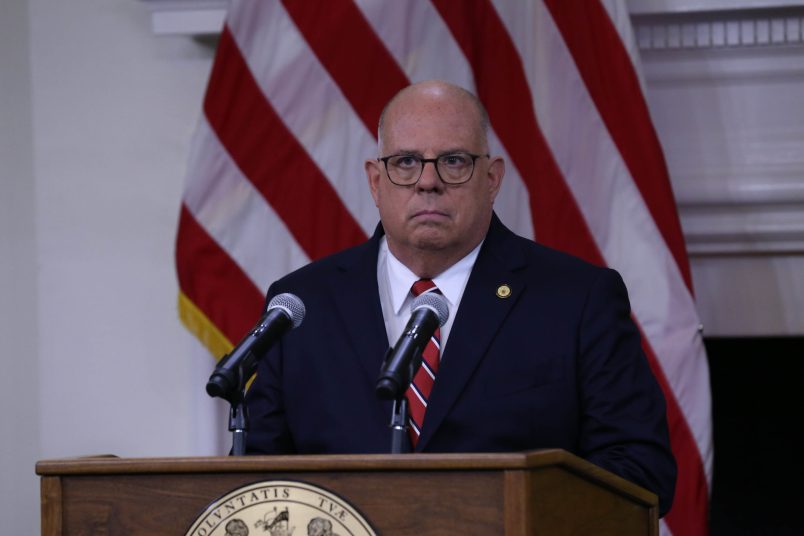The Supreme Court last month struck down a century-old New York state gun restriction, broadening the Second Amendment as the nation weathers a now-familiar spate of deadly mass shootings. It was the first major gun control ruling from the High Court in a decade, and a win for the gun lobby and gun rights groups.
Though the case before the Court was a challenge to New York’s laws, the ruling will impact several others states, many home to large, dense cities, that have similar laws on the books.
New York’s now-invalidated law required that concealed carry applicants demonstrate “proper cause” for why they might need to carry a firearm outside of the home. The state would then issue restrictive or non-restrictive concealed carry licenses based on its assessment of each application. The 6-3 ruling found that such a law violated the Constitution, and, now, states with similar laws — Maryland, California, Hawaii, Massachusetts, New Jersey and Rhode Island — must grapple with the decision.
Maryland’s Republican Gov. Larry Hogan announced today that his state will no longer be enforcing its New York-like law; Hogan said he has asked the Maryland state police to stop requiring license applicants to demonstrate a “good and substantial reason” to carry a weapon outside the home. In his announcement, Hogan said his directive was in response to the SCOTUS ruling on New York’s law, which he described as “virtually indistinguishable” from Maryland’s law.
“I have consistently supported the right of law-abiding citizens to own and carry firearms, while enacting responsible and common-sense measures to keep guns out of the hands of criminals and the mentally ill,” Hogan said in a statement announcing the decision.
Massachusetts’ attorney general also has issued a directive to law enforcement in recent days, asking that agencies suspend the enforcement of the state’s “good reason” law for concealed carry in light of the ruling.
Other states, including New York, California and Rhode Island, have sought new ways to tighten gun laws in response to the decision. In the hours after the ruling, New York City council members implored the state legislature to dramatically expand the definition of what qualifies as a “sensitive location” in the state. City council members proposed that all of New York City be defined as a gun-free zone in the same way a school might be, proposing that any area with more than 10,000 people per square mile be considered a “sensitive location.”
“We are formally and proactively presenting this idea to the state legislature because the threat to New York City is so very serious,” city council Speaker Adrienne Adams said on the day of the ruling. New York City Mayor Eric Adams also expressed support for similar measures.
Albany responded rather quickly. The New York state legislature passed the Concealed Carry Improvement Act on Friday, which, among other things, strengthens background check laws (applicants must provide access to their social media accounts as part of the process) and requires those seeking concealed carry licenses to demonstrate “good moral character” and pass a gun safety class as part of their application. The law also codifies what might be defined as a “sensitive location” into law, applying it to places like schools, playgrounds, zoos, Times Square, mass transit systems and other public arenas. New York’s governor Kathy Hochul was asked last week whether there were any public places that would slip through the new law — where guns still would be allowed. “Probably some streets,” she replied, per Gothamist.
During the Supreme Court’s oral arguments on the New York case last year, liberal justices and Chief Justice John Roberts signaled hesitancy about striking down the law due to the complex and frightening circumstances that limitless concealed carry presents in a state with a massive metropolitan area like New York City. Roberts at the time even raised the idea of leaving wiggle room for New York state and other states to more broadly define what is classified as “sensitive locations.” Justice Elena Kagan specifically mentioned the danger presented by allowing unfettered gun carrying in locations like “New York City subways.”
A few months later a gunman opened fire on a moving train car in Brooklyn.
The Best Of TPM Today
Here’s what you should read this evening:
The latest from Josh Kovensky: How The Fake Electors Scheme Could Give The DOJ A Way Into Trumpworld
Breaking news today: Atlanta Grand Jury Issues Subpoenas To Trump Legal Team, Lindsey Graham In Big Lie Probe
Biden Planned On Nominating McConnell’s Anti-Abortion Judge On Day SCOTUS Overturned Roe
From ProPublica: Federal Patient Privacy Law Does Not Cover Most Period-Tracking Apps
Kinzinger Posts Audio Of Violent Threats Interns Have Fielded For Him
Sign up for TPM’s voting rights newsletter here: Will SCOTUS Give State Republicans Free Rein On Elections?
Yesterday’s Most Read Story
Trump Lashes Out At Cheney Over Possible Criminal Referrals — Summer Concepcion
What We Are Reading
How the end of Roe and the Uvalde school shooting could reshape the race for Texas governor — Patrick Svitek
Nazi Tapes Provide a Chilling Sequel to the Eichmann Trial — Isabel Kershner
Christian Nationalists Are Excited About What Comes Next — Katherine Stewart






